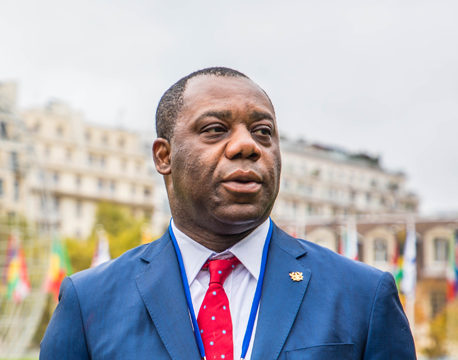15 CSOs raise alarm over GNPC plans to acquire stakes in Aker Energy
Fifteen civil society organisations (CSOs) working in the extractive industry have raised an alarm over a planned acquisition of stakes in Aker Energy and AGM Petroleum Ghana oil blocks by the Ghana National Petroleum Corporation (GNPC).
According to the group, the country would be short-changed should the current state of the deal be given parliamentary approval.
While noting that it is, in principle, not opposed to the government’s decision to increasing its stake in natural resource ownership, it feared, the Aker Energy and AGM Petroleum deal would threaten the country’s economic and fiscal outlook.
Among other issues, the group is of the view that Aker energy stands to benefit at the expense of the government in this deal.
According to the group, GNPC is providing a better deal to Aker than it could find elsewhere to raise capital to invest and bear risk.
They contend that the proposal gives Aker the funds to procure floating production storage and offloading (FPSO) at US$600 million and lease to the project for risk-free benefits, finance its development cost for the minimal stake at US$140 million and keep US$560 million in the bank.
“With these high-cost claims, Aker makes a profit of about US$500 million on the proposed acquisition value of US$1.3 billion. If the cost is imposed at US$965 million as presented to the EMT, Aker still makes about US$350 million of profit for selling part of its stake in the blocks,” they argue.
Adding that, “the gains for Aker increase astronomically when analysed on additional information we have, which suggest that the cost of US$420 million being pushed on GNPC is the cost available to the Commission for the entire field, and the prorated cost for GNPC should instead be about US$155 million for the stake.”
Touching on the cost of capital for the deal, the 15 CSOs argued that the deal in its current state would further worsen the country’s debt situation, by adding about 5% to the debt stock.
They clarify that the government could charge high interest to GNPC, but the proposal ignores this cost, which implies that GNPC is making a risky bet, “but betting the public’s money, not their own.”
They argue further, noting that only a small group of people, particularly, those in companies that receive “local content” subcontracts on projects, would be beneficiaries in case the acquisition happens.
This is at the expense of a relatively higher number of Ghanaians who would have benefited if such funds were pushed into other sectors of the economy than oil and gas.
Another issue of concern by the CSOs is in relation to the GNPC becoming an excellent upstream operator through this acquisition deal. According to GNPC, the acquisition of stakes in the two firms would make them learn to be a top-notch upstream operator.
However, the group is of the view that the structure of the transaction only makes GNPC Explorco a relatively passive joint operator, with limited opportunity to learn by doing.
Having raised these arguments, the CSOs have remarked that, by analysis of the proposals by GNPC and the government, “we are clear in our minds that the transactions if approved, will short-change Ghana.”
Therefore, they have called on parliament “to intervene, given that the deal has gone through all the relevant branches of the Executive, ostensibly glossing over important threats of the transaction to the country’s fiscal situation.”
In addition, they have requested that Parliament institute a full-scale investigation into the transaction “to verify the actual cost incurred by Aker so far on the Blocks, clarify the inconsistencies in the presentations by GNPC and allow for open consultation and hearing to provide opportunities for independent expert opinions.”
The CSOs are the Africa Centre for Energy Policy (ACEP), Centre for Extractives and Development Africa (CEDA), National Coalition on Mining (NCOM), IMANI Centre for Policy and Education, Integrated Social Development Centre (ISODEC), and Publish What You Pay Ghana (PWYP).
Others are, the Ghana Anti-Corruption Coalition (GACC), Institute for Energy Security (IES), Civil Society Platform on Oil and Gas (CSPOG), CSOs Open Licensing Monitoring Group, and the Natural Resource Governance Institute (NRGI).
The rest are the Chamber of Petroleum Consumers Ghana (COPEC), TAMA Foundation, Oil Watch Ghana, and the Institute of Energy Policies and Research (INSTEPR).
READ ALSO: GNPC Seeks For $1.65 Billion For Oil And Gas Exploration
Parliament’s Joint Committee on Energy and Finance recommended the approval of the government’s request for a loan to enable Ghana National Petroleum Corporation (GNPC) to acquire a 37% stake in Aker Energy and a 70% stake in AGM Petroleum’s oil blocks.
This was after Parliament referred the paper presented to it by the Energy Minister, Dr Matthew Opoku Prempeh, last week.
The committee said, its decision, which was agreed to by consensus, was arrived at after members diligently analysed the risks and benefits of the transaction as presented by the Ministries of Energy/Finance and GNPC.
However, the committee reduced the amount requested by the government for the transaction from $1.65 billion to $1.45 billion.
The Corporation argues that the partnership, which has already received cabinet approval, would, in about five years, help the country produce an extra 200,000 barrels of crude oil.



